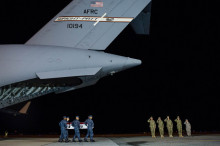Many of you will recognize the title of this post The Forever War as the same title of Dexter Filkens’ best-selling book. That book became an instant classic of war reporting, and was hailed as the definitive account of America’s conflict with Islamic fundamentalism and its human costs.
Through the eyes of Filkins, a foreign correspondent for the New York Times, we witnessed the rise of the Taliban in the 1990s, the aftermath of the attack on New York on September 11th, and the American wars in Afghanistan and Iraq.
But Filkens’ book was published eight years ago – and that war still drags on. Today, Brian Caster, a former explosive ordnance disposal officer who fought in The Forever War takes Filkins’ thoughts to the next level in his piece, “Still Fighting, Dying, in the Forever War.” He point out how different this war is from all our other wars. Here is part of what he shares.
“The longest conflict in American history — from Afghanistan to Iraq, to high-value target missions throughout Africa and the Middle East — has resulted in the nation’s first sustained use of the all-volunteer military, wounding and killing more and more service members who resemble Scotty: parents, spouses, career men and women. When compared with casualties of the Vietnam War, the average age of our dead in this conflict, and the proportion who are married, have both risen 20 percent. And that trend is accelerating as the burden of the fight shifts more and more to older, highly trained counterterrorism forces. As The Times reported recently, of the 18 service members lost in combat since 2016, 12 were Special Operations troops like Scotty [Navy Senior Chief Petty Officer Scott Dayton].”
“Our country has created a self-selected and battle-hardened cohort of frequent fliers, one that is almost entirely separate from mainstream civilian culture, because service in the Forever War, as many of us call it, isn’t so much about going as returning. According to data provided by the Center for a New American Security, of the 2.7 million veterans of Iraq and Afghanistan, half have done multiple tours. More telling, 223,000 have gone at least four times, and 51,000 have done six or more deployments.”


